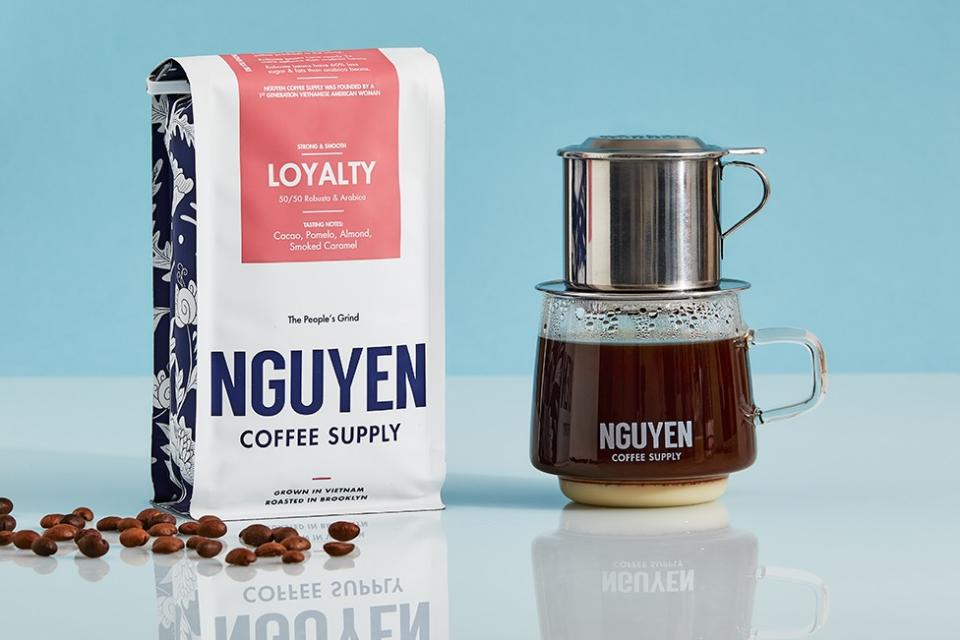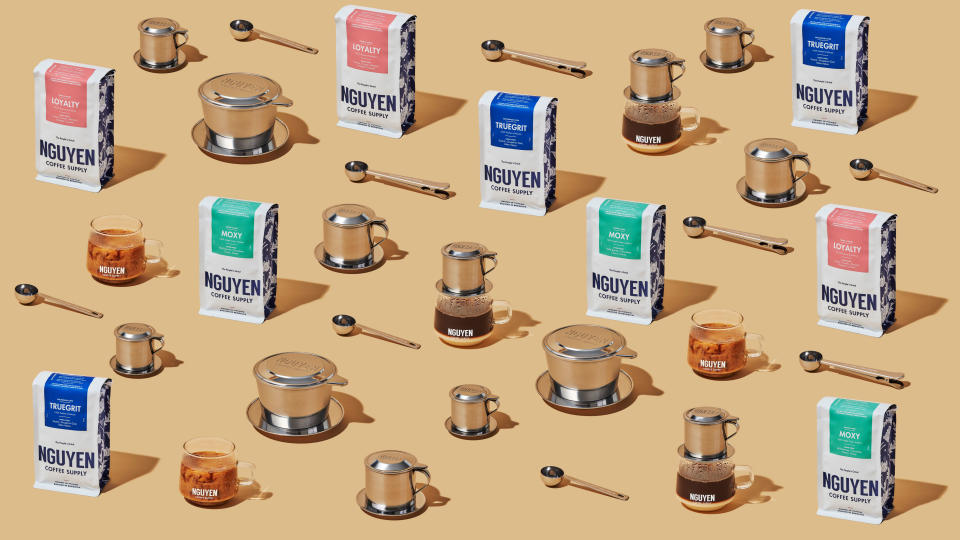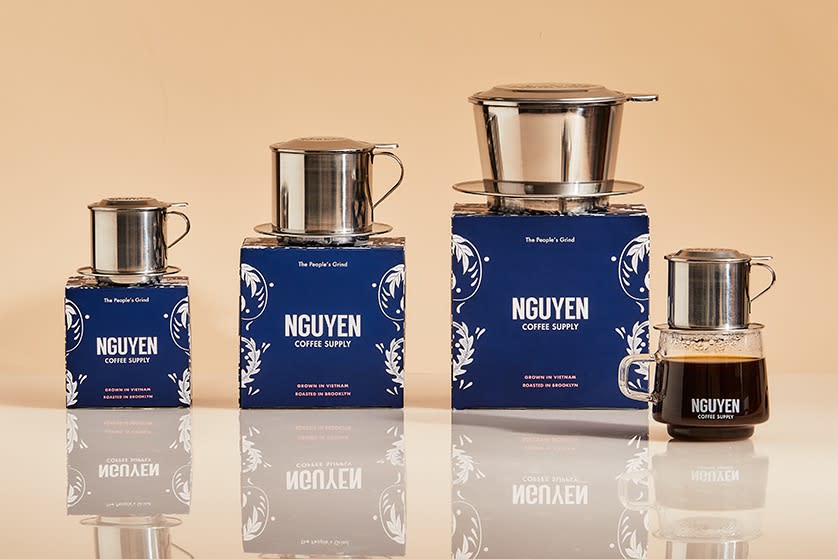Entrepreneur Sahra Nguyen Is Changing the Way Coffee Lovers Think About Vietnamese Coffee

Coffee enthusiasts love to discuss the merits of certain growing regions, whether that’s the rich flavor of Colombian coffee or the sweetness of Ethiopian coffee. One region that’s often overlooked is Vietnam, despite the fact that Vietnam is the one of largest coffee-producing countries in the world, second only to Brazil.
Vietnam primarily produces robusta, which many consumers, especially in the US, have come to see as inferior to arabica. One person looking to change that perception is Sahra Nguyen, an entrepreneur who sells Vietnamese and robusta coffee through her company Nguyen Coffee Supply. Nguyen sees her role as more than just selling great coffee, but also educating coffee lovers on the value of robusta coffee while also elevating underappreciated growers in Vietnam. I had a chance to interview Nguyen, and we discussed what makes robusta special, how she started her company, and why the growing appreciation of Vietnamese coffee is just getting started.
Today's Top Deals
Before starting her company, Nguyen was a documentary film freelancer in New York City. Like many freelancers, she spent a good chunk of her time in coffee shops, and she started noticing cafes advertising Vietnamese coffee, alongside a broader trend of Vietnamese food growing in popularity.
As a first-generation Vietnamese American, she was already familiar with Vietnamese coffee. She found that, in many cases, what was being sold in cafes wasn’t Vietnamese coffee at all. “It didn’t even taste like Vietnamese coffee to me. It was more on the sour side, more on the acidic side. And I would ask the barista ‘what’s in your Vietnamese iced coffee?,’ and they’d say ‘it’s the house Brazilian’ or ‘house Colombian’ and ‘we add sweet condensed milk to it.'”
Nguyen was frustrated by the fact that Vietnamese coffee was becoming popular and trendy, but in a way that obfuscated the real drink and didn’t benefit Vietnamese coffee growers at all.

This frustration also served as what she calls the “lightbulb moment” that kicked off the journey to make what would become Nguyen Coffee Supply.”I felt like there was a strong signal that people were really interested in Vietnamese coffee culture, but they didn’t have access to real Vietnamese coffee beans.”
And in order to enjoy authentic Vietnamese coffee, Nguyen knew that meant opening coffee consumers’ palettes to robusta. There are many different varieties of coffee, but the two most widely produced are arabica, which accounts for about 60% of the world’s coffee, and robusta, which accounts for the other 40%. Arabica is sweeter and more acidic, while robusta is earthier and bolder. Vietnam is the second-largest producer of coffee in the world and the largest producer of robusta.
Arabica is notoriously fickle, requiring high elevations and specific temperatures to grow. Robusta grows at lower elevations and is generally hardier, hence its name. Robusta also has other benefits, which Nguyen is quick to point out. Robusta “has double the caffeine content, 60 percent less fats and sugars, double the antioxidants, so in flavor profile, in caffeine, in energy, it’s completely different from arabica.”

Because it’s historically been cheaper to produce, robusta has often been funneled into cheaper products like instant coffee, which Nguyen sees as part of a vicious cycle that hurts the perception of an otherwise valuable and tasty coffee variety. Nguyen argues “all the effort we’re putting into arabica from a certain part of the country, if we’re willing to apply the same level of effort [to robusta], if we’re willing to help evolve robusta coffee industry to make it better, what can we really accomplish?”
For Nguyen, it was also important to look beyond the bean and respect the people who grow it. As Nguyen had conversations with growers in Vietnam, they described frustrations with not being able to get the same rates other growing regions were getting. Because of a lack of demand for high-quality robusta beans, growers “lose money because they have to sell that product to the commodity market, so there’s no incentive for producers to improve the quality if there’s going to be no ecosystem to that work.”
In order for Nguyen Coffee Supply to work, there would need to be a demand in the US and elsewhere for real Vietnamese coffee. That includes changing the perception of robusta. There would also need to be a supply of high-quality coffee to meet that demand.
Without any formal connections to the coffee industry, Nguyen leveraged her personal connections to find a supplier. When visiting Vietnam, she brought up to her family her plans to start a coffee company. “I was like ‘oh I’m thinking about starting this Vietnamese coffee company [and] bringing Vietnamese coffee to the US, if you know anyone,’ and my aunt was like ‘I do.” Since starting her company, Nguyen has continued to work with the same grower she met through her aunt.
As for generating demand, Nguyen sees social media as a key tool in educating and informing consumers. You can find in-depth videos on Nguyen Coffee Supply’s Youtube alongside shorter explainers on Instagram. Traditional media has played a role, too. Nguyen has been interviewed by The New York Times, The Wall Street Journal, Vice, and Forbes, appeared on The Drew Barrymore Show, and was featured on the cover of Food&Wine.

In addition to raising consumer awareness of Vietnamese coffee, the crop, Nguyen is also educating coffee lovers about Vietnamese coffee, the drink. Cà phê ?á, or Vietnamese iced coffee, is a coffee drink that’s brewed hot using a metal filter called a phin and served iced with sweet condensed milk.
A phin consists of a metal vessel with holes on the bottom, a press that sits on top of the grounds, a second filter plate that sits under the cup and a lid. Like any method that’s new to you, brewing with a phin can take some fine-tuning, but it has the advantage of being conveniently sized (it’s great for travel), durable (it’s made from metal) and less wasteful (no paper filters required). For brewing, Nguyen coffee supply recommends a 2:1 water-to-coffee ratio, which creates a highly concentrated brew. In that sense, it can be enjoyed in small servings, similar to espresso.
The origin of Vietnamese iced coffee was born out of necessity and practicality, as Nguyen points out. As a hot, tropical country, drinking coffee iced makes sense in Vietnam. As Vietnam developed, “refrigeration wasn’t really available for everyone, so fresh milk wasn’t really a thing until like more recently, hence the sweetened condensed milk. So because of those social, cultural, economic and agricultural conditions, that produced the cà phê ?á.” If you want to brew cà phê ?á the traditional way, Nguyen Coffee Supply sells three sizes of phin filter, as well as a brewing pitcher.
But Nguyen believes Vietnamese robusta coffee is more versatile than just one drink. “Vietnamese coffee doesn’t have to be sweet condensed milk and ice. Just like any coffee bean you can drink it hot, you can drink it black you can drink it with oat milk. One thing we hear from our community is ‘this is so good, I could drink it black.’ We’re using fresh quality beans, we’re using single origin beans, we’re fresh roasting it in Brooklyn.”
For her own part, Nguyen likes using her brand’s arabica/robusta coffee blend, Loyalty, with espresso. “We have a home espresso machine, it’s a La Marzocco Linea Mini, which I invested in right before the pandemic. So the routine is lately, Loyalty, our robusta arabica blend. I love it with whole milk, I’ll also do it with a squeeze of sweet condensed milk in my latte.” Though robusta is a passion for Nguyen, Nguyen Coffee Supply also sells 100% arabica coffee, which is also grown in Vietnam.

Nguyen Coffee Supply is available through their website, and you can buy individual bags of coffee, canned cold brew, and brewing equipment like phin filters. Nguyen Coffee Supply is also stocked in Whole Foods, and it took some work to convince the grocery giant to invest in Vietnamese coffee. “We actually changed Whole Foods’ policy around robusta beans. We became the first coffee company to transparently label and sell robusta beans on the shelves.”
Nguyen hopes to make a bigger push into traditional retail. “We want to be able to meet our customers where they’re at, and that’s in retail, that’s in grocery stores. So we’re really looking forward to that.” Already, the market is changing, and Nguyen is excited about the new Vietnamese coffee companies that are appearing, even though they could be considered competitors.
“I’ve seen so many crop up over the last couple years, and I always get so excited. This is the next wave of Asian-inspired beverages in America, this is the next wave of coffee culture in America. It’s rooted in the most underappreciated, underexplored region in the world, Asia. It’s rooted in the second-largest coffee producer in the world, Vietnam. It’s rooted in the most underappreciated variety of coffee in the world, robusta. We’re so early in this wave.”

Original Vietnamese Coffee Trio
Buy Now $48.99

Cold Brew: Classic Black
Buy Now (6 Pack) $32.00

Phin Filter
Buy Now $18
More Top Deals from SPY